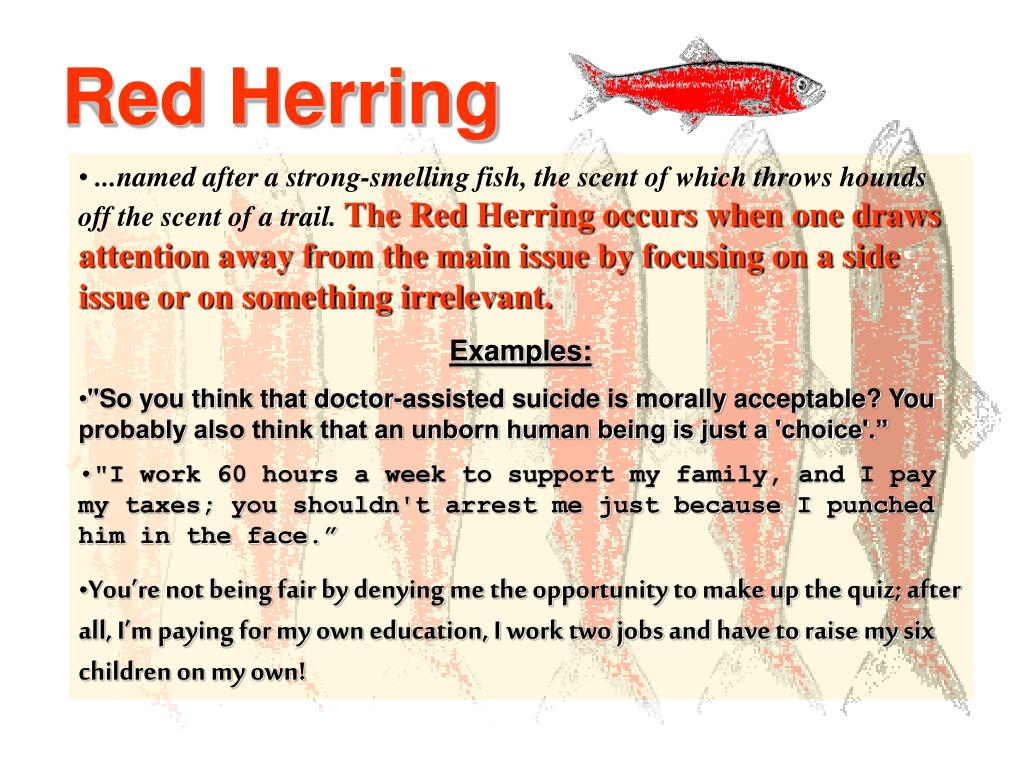

As such, red herring fallacies do not really have a logical structure, which is one reason why they are fallacious. In that sense, red herring fallacies are informal fallacies. Red herrings are not so much a matter of logic but rhetoric. Red herring fallacies function to derail conversations, which is why they can be so frustrating. It is often used when one person wants to avoid a line of questioning or avoid committing to a specific position. Red herring fallacies are often used in debate contexts to shift the topic of conversation. Instead of addressing that, John brings up a completely different issue that is irrelevant to the current context. John broke a promise and Bob has a legitimate grievance. It’s a red herring because it is irrelevant to the context. John’s statement commits the red herring fallacy.

John: “Oh yeah? What about that time you didn’t show up to my birthday party?” Consider this conversation:īob: “I’m disappointed you broke your promise and didn’t help me move.” Red herring fallacies also pop up in more benign, everyday contexts. The reporter did not ask a question about their opponent’s views on immigration. Even if it’s true that their opponent wants open borders and such, it is irrelevant to the topic at hand. In response to a question asking about their views on immigration, A instead talks about his opponent’s stances. Politician A is clearly committing a red herring fallacy. Politician A: “I have been working hard to make this country successful for its citizens, unlike my opponent, who favors completely open borders and mass generational immigration.” Reporter: “What steps would you take to deal with current issues involving immigration in the US?” Imagine the following conversation between a reporter and a politician: Here is a simple example of a red herring fallacy. A red herring can be a way to dodge a question, avoid talking about some point, or distract from the main issue. In debate and rhetoric, red herring fallacies occur when someone presents a piece of information that is actually irrelevant to the topic being discussed. Aringarosa’s character is meant to distract and mislead the reader so that the end reveal is more surprising (Fun fact: the Italian name “Aringarosa” translates to “red herring” in English.

However, the novel later reveals that Aringarosa is actually innocent, and other people are pulling the strings. That is why it’s extremely important to be able to point out when someone is presenting irrelevant information in their argument. Red herring fallacies are particularly troublesome not only because they’re fallacious, but also because they can completely stall any debate or conversation. Red herring fallacies are often used to obfuscate and derail a conversation, rather than facilitate a debate. A red herring fallacy is a logical fallacy that occurs when someone presents a seemingly important but actually irrelevant piece of information, in order to distract from the main topic being discussed. Red herrings also pop up in rhetoric and argumentation. For example, an author might introduce some plot point to distract the reader and mislead them so the ending is more surprising. In literature circles, a red herring is a narrative element that is meant to mislead readers by providing irrelevant information. Please do your own research before making any online purchase. As an Amazon Associate we earn from qualifying purchases. There might be affiliate links on this page, which means we get a small commission of anything you buy.


 0 kommentar(er)
0 kommentar(er)
